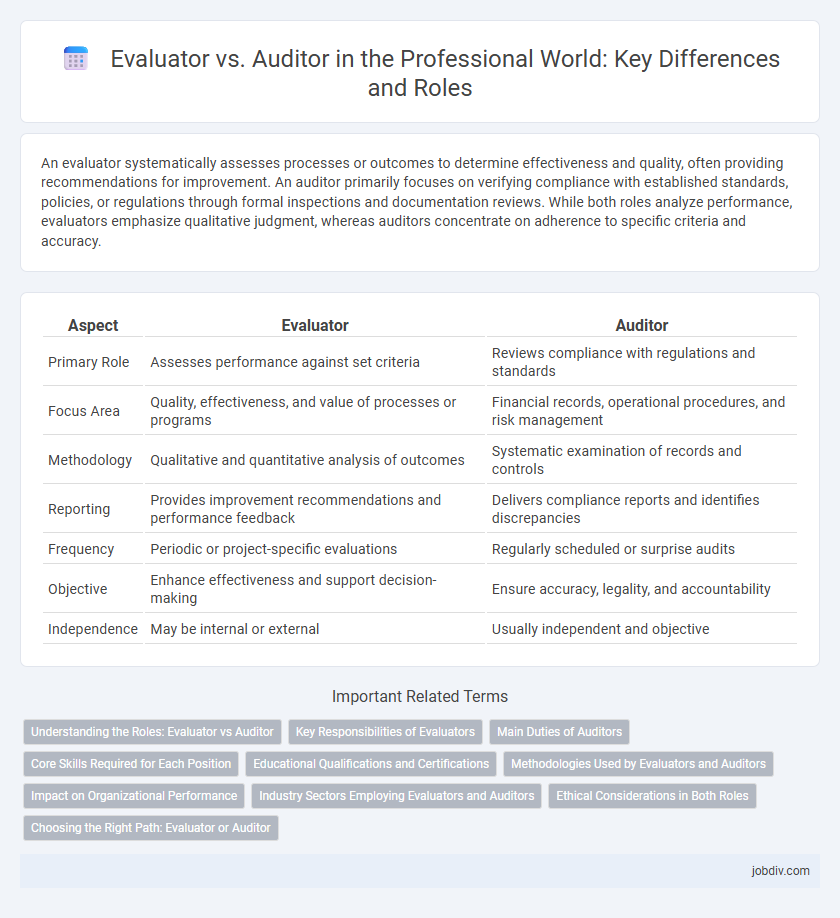An evaluator systematically assesses processes or outcomes to determine effectiveness and quality, often providing recommendations for improvement. An auditor primarily focuses on verifying compliance with established standards, policies, or regulations through formal inspections and documentation reviews. While both roles analyze performance, evaluators emphasize qualitative judgment, whereas auditors concentrate on adherence to specific criteria and accuracy.
Table of Comparison
| Aspect | Evaluator | Auditor |
|---|---|---|
| Primary Role | Assesses performance against set criteria | Reviews compliance with regulations and standards |
| Focus Area | Quality, effectiveness, and value of processes or programs | Financial records, operational procedures, and risk management |
| Methodology | Qualitative and quantitative analysis of outcomes | Systematic examination of records and controls |
| Reporting | Provides improvement recommendations and performance feedback | Delivers compliance reports and identifies discrepancies |
| Frequency | Periodic or project-specific evaluations | Regularly scheduled or surprise audits |
| Objective | Enhance effectiveness and support decision-making | Ensure accuracy, legality, and accountability |
| Independence | May be internal or external | Usually independent and objective |
Understanding the Roles: Evaluator vs Auditor
Evaluators systematically assess processes, performance, or outcomes to provide insights for improvement, using qualitative and quantitative criteria tailored to specific objectives. Auditors conduct formal, independent examinations of financial records, compliance, or operational procedures to ensure accuracy, adherence to regulations, and risk mitigation. Understanding the different focuses--evaluation emphasizes judgment and enhancement, while auditing centers on verification and accountability--is crucial for effective organizational governance.
Key Responsibilities of Evaluators
Evaluators systematically assess project outcomes and performance metrics to ensure alignment with organizational objectives and standards. They collect and analyze qualitative and quantitative data to provide evidence-based insights that guide decision-making and strategic improvements. Evaluators also develop evaluation frameworks and criteria, often collaborating with stakeholders to enhance program effectiveness and accountability.
Main Duties of Auditors
Auditors primarily conduct systematic examinations of financial statements and records to ensure accuracy, compliance with accounting standards, and regulatory requirements. They assess the effectiveness of internal controls, identify risks of fraud or error, and provide recommendations to improve financial reporting and operational efficiency. Auditors generate detailed audit reports that support transparency and accountability for stakeholders.
Core Skills Required for Each Position
Evaluators require strong analytical skills to assess program effectiveness, attention to detail for accurate data interpretation, and proficiency in qualitative and quantitative research methods. Auditors need expertise in accounting principles, risk assessment capabilities, and thorough knowledge of regulatory compliance and internal controls. Both roles demand excellent communication skills to present findings clearly to stakeholders.
Educational Qualifications and Certifications
Evaluators typically hold advanced degrees in fields related to education, social sciences, or program evaluation, often complemented by certifications such as the Certified Evaluator (CE) credential. Auditors usually possess educational backgrounds in accounting, finance, or business administration, with professional certifications like Certified Public Accountant (CPA) or Certified Internal Auditor (CIA) enhancing their qualifications. Both roles require specialized training, but evaluators emphasize analytical and research skills, whereas auditors focus on compliance, financial accuracy, and regulatory standards.
Methodologies Used by Evaluators and Auditors
Evaluators employ qualitative and quantitative research methods such as case studies, surveys, and experimental designs to assess program effectiveness and outcomes. Auditors use systematic procedures including risk assessments, sampling techniques, and compliance checks based on established standards like Generally Accepted Auditing Standards (GAAS) to examine financial records and operational processes. Both methodologies involve data collection and analysis, but evaluators focus on impact measurement while auditors emphasize accuracy and regulatory adherence.
Impact on Organizational Performance
Evaluators assess organizational processes and outcomes to identify strengths and areas for improvement, driving strategic decision-making and enhancing overall performance. Auditors systematically review compliance and financial accuracy, ensuring accountability and risk mitigation, which safeguards the organization's operational integrity. Both roles contribute critically to sustained organizational success by promoting transparency, efficiency, and continuous improvement.
Industry Sectors Employing Evaluators and Auditors
Industries such as finance, healthcare, and manufacturing frequently employ auditors to ensure regulatory compliance and financial accuracy. Evaluators are commonly found in education, non-profits, and government sectors where program effectiveness and impact measurement are critical. Both roles are essential in sectors like energy and construction, where risk assessment and operational performance reviews are prioritized for strategic decision-making.
Ethical Considerations in Both Roles
Evaluators prioritize objectivity and confidentiality to ensure unbiased assessments while maintaining stakeholder trust, whereas auditors must adhere strictly to regulatory standards and internal controls to uphold financial integrity. Both roles require a strong commitment to transparency and independence to avoid conflicts of interest and ensure ethical compliance. Ethical considerations in evaluation and auditing also encompass accountability and the protection of sensitive information throughout the review processes.
Choosing the Right Path: Evaluator or Auditor
Evaluators specialize in assessing program effectiveness and outcomes through qualitative and quantitative analysis, providing strategic insights for improvement. Auditors focus on compliance, accuracy, and risk management by systematically examining financial records and internal controls to ensure regulatory adherence. Selecting between evaluator and auditor roles depends on whether the goal is to enhance performance metrics or to validate financial integrity and legal compliance.
Evaluator vs Auditor Infographic

 jobdiv.com
jobdiv.com